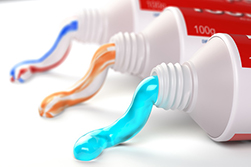Types of Toothpaste for Protecting Sensitive Teeth
Posted on 9/1/2025 by Viva Smiles Family Dental Office |
 There are many different types of toothpaste available, each with its own set of benefits and drawbacks. But when it comes to sensitive teeth, not all toothpastes are created equal. If you suffer from tooth sensitivity, it's important to choose a toothpaste that is specifically designed to help protect your teeth. There are many different types of toothpaste available, each with its own set of benefits and drawbacks. But when it comes to sensitive teeth, not all toothpastes are created equal. If you suffer from tooth sensitivity, it's important to choose a toothpaste that is specifically designed to help protect your teeth.
What Causes Sensitive Teeth?
Tooth sensitivity occurs when the dentin, the layer of tissue beneath the enamel, becomes exposed. Dentin contains microscopic tubules that connect to the nerve of the tooth. When these tubules are exposed, they can be irritated by hot, cold, sweet, or acidic foods and drinks, causing a sharp, shooting pain.
There are a number of things that can cause tooth sensitivity, including:
| • |
Receding gums: As gums recede, they expose the dentin, making teeth more sensitive. |
| • |
Worn tooth enamel: Enamel can be worn down by acidic foods and drinks, brushing too hard, or teeth grinding. |
| • |
Cracked or chipped teeth: Cracks and chips in teeth can expose the dentin. |
| • |
Dental procedures: Some dental procedures, such as fillings and crowns, can leave teeth more sensitive. |
Types of Toothpaste for Sensitive Teeth
There are two main types of toothpaste for sensitive teeth:
| • |
Desensitizing toothpastes: These toothpastes contain ingredients that help to block the tubules in the dentin, preventing them from being irritated. Some common desensitizing ingredients include potassium nitrate, strontium chloride, and arginine. |
| • |
Fluoride toothpastes: Fluoride helps to strengthen tooth enamel, making it more resistant to wear and tear. This can help to reduce sensitivity caused by worn enamel. |
Choosing the Right Toothpaste
When choosing a toothpaste for sensitive teeth, it's important to look for one that contains both desensitizing and fluoride ingredients. You should also avoid toothpastes that contain abrasives, as these can further irritate sensitive teeth.
It's also important to talk to your dentist about your tooth sensitivity. They can help you identify the cause of your sensitivity and recommend the best course of treatment.
Additional Tips for Protecting Sensitive Teeth
In addition to using the right toothpaste, there are a few other things you can do to protect your sensitive teeth:
| • |
Use a soft-bristled toothbrush: This will help to prevent further irritation to your gums and teeth. |
| • |
Brush gently: Avoid brushing too hard, as this can damage your teeth and gums. |
| • |
Use a fluoride mouthwash: Fluoride mouthwash can help to strengthen your teeth and reduce sensitivity. |
| • |
Avoid acidic foods and drinks: Acidic foods and drinks can erode tooth enamel and make teeth more sensitive. |
| • |
See your dentist regularly: Regular dental checkups and cleanings can help to prevent tooth sensitivity and other dental problems. |
By following these tips, you can help to protect your sensitive teeth and keep your smile healthy and bright.
|
|